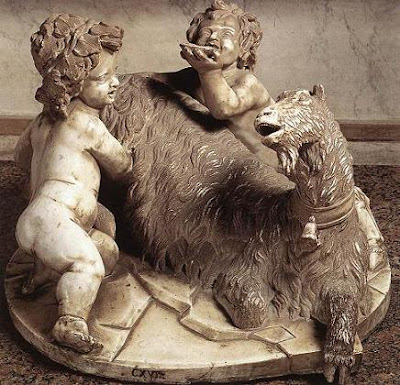1. αἴξ ~ αἰγός (c.): goat2. κέρας ~ κέρατος (n.): horn3. μάθημα ~ μαθήματος (n.): lesson, knowledge4. μήτηρ ~ μητρός (f.): mother5. δένδρον ~ δένδρου (n.): tree
Here are the proverbs and sayings:
Τὸ τῆς Ἀμαλθείας κέρας.
Τα παθήματα μαθήματα.
Μήτηρ τῆς ἐνδείας ἡ ἀεργία.
Ἐκ τοῦ καρποῦ τὸ δένδρον γινώσκω.
Plus some commentary:
Αἴξ τὴν μάχαιραν.
The goat (supplies) the knife.
The saying alludes to a story about a goat sacrifice: the temple priest was going to sacrifice a goat, but he couldn't find the knife... until the goat, scratching with its hoof, uncovered the knife in the dirt — the very knife that was used to sacrifice the goat! There is also a version with a sheep: Οἷς τὴν μάχαιραν. Compare the Spanish saying, "Escarbó el gallo, y descubrió el cuchillo para matallo," "The rooster scratched, and uncovered the knife to kill him."
Τὸ τῆς Ἀμαλθείας κέρας.
The horn of Amaltheia.
This saying refers to a mythological "horn of plenty." Amaltheia was the foster-mother of the baby Zeus, whom his mother had to conceal from his father, and in some traditions, she was imagined to be a goat. When baby Zeus accidentally broke off one of her horns, the horn became a magical "horn of plenty" pouring forth food and drink in abundance. You can find out more at Wikipedia: Amalthea and Wikipedia: Cornucopia. The Greek κέρας gives us the scientific term keratin, the protein found in horns, nails, claws, hooves, etc.
Τα παθήματα μαθήματα.
Sufferings (are) lessons.
The play on words in the Greek is lost in the English, alas, but it can be replicated in Latin: "Nocumentum, documentum." Both the words πάθημα and μάθημα are nouns formed from verbs: πάσχω, experience or suffer, and μανθάνω, learn, the idea being that to undergo some experience, especially a negative experience, teaches you a lesson. From the Greek root in πάθημα we get the English word empathy and from μάθημα, mathematics.Μήτηρ τῆς ἐνδείας ἡ ἀεργία.
The mother of neediness is idleness.
The reason "lack" has a mother instead of a father is because ἀεργία is a feminine noun: ἀ-εργία, un-work, i.e. idleness. The message of the proverb is that idleness gives birth to neediness; if you don't work, you are going to lack the things you need. The word μήτηρ is related to the English word mother; you can learn more at Wikipedia: Indo-European kinship terms.
Ἐκ τοῦ καρποῦ τὸ δένδρον γινώσκω.
From the fruit, I know the tree.
Compare a similar saying in the Gospel of Matthew: Ἀπὸ τῶν καρπῶν αὐτῶν ἐπιγνώσεσθε αὐτούς, "Ye shall know them by their fruits." You can find out more at Wikipedia: The Tree and its Fruits. From Greek δένδρον we get the English term dendrochronology.
Here's Bernini's Amalthea with Jupiter and a Faun:
Click here to subscribe/unsubscribe to the email list.

No comments:
Post a Comment